不用yes和no回答的一般疑问句
初一英语上册:含be动词一般疑问句考点
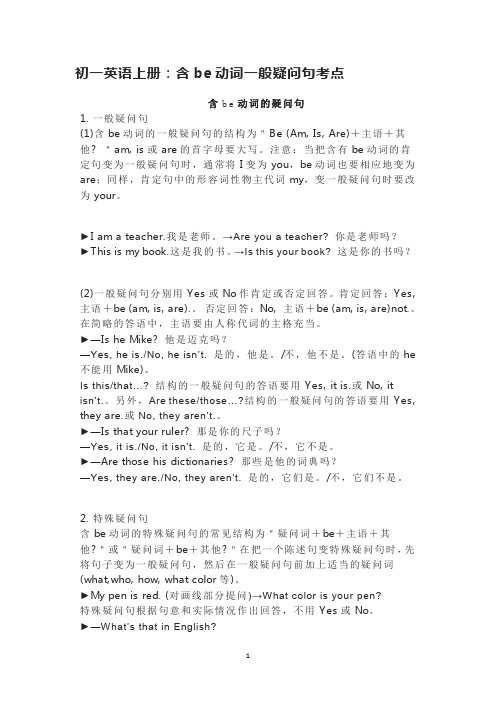
初一英语上册:含be动词一般疑问句考点含be动词的疑问句1. 一般疑问句(1)含be动词的一般疑问句的结构为"Be (Am, Is, Are)+主语+其他? "am, is或are的首字母要大写。
注意:当把含有be动词的肯定句变为一般疑问句时,通常将I变为you,be动词也要相应地变为are;同样,肯定句中的形容词性物主代词my,变一般疑问句时要改为your。
►I am a teacher.我是老师。
→Are you a teacher? 你是老师吗?►This is my book.这是我的书。
→Is this your book? 这是你的书吗?(2)一般疑问句分别用Yes或No作肯定或否定回答。
肯定回答:Yes, 主语+be (am, is, are).。
否定回答:No, 主语+be (am, is, are)not.。
在简略的答语中,主语要由人称代词的主格充当。
►—Is he Mike? 他是迈克吗?—Yes, he is./No, he isn’t. 是的,他是。
/不,他不是。
(答语中的he 不能用Mike)。
Is this/that…? 结构的一般疑问句的答语要用Yes, it is.或No, it isn’t.。
另外,Are these/those…?结构的一般疑问句的答语要用Yes, they are.或No, they aren’t.。
►—Is that your ruler? 那是你的尺子吗?—Yes, it is./No, it isn’t. 是的,它是。
/不,它不是。
►—Are those his dictionaries? 那些是他的词典吗?—Yes, they are./No, they aren’t. 是的,它们是。
/不,它们不是。
2. 特殊疑问句含be动词的特殊疑问句的常见结构为"疑问词+be+主语+其他?"或"疑问词+be+其他?"在把一个陈述句变特殊疑问句时,先将句子变为一般疑问句,然后在一般疑问句前加上适当的疑问词(what,who, how, what color等)。
语法点:一般疑问句和特殊疑问句讲解
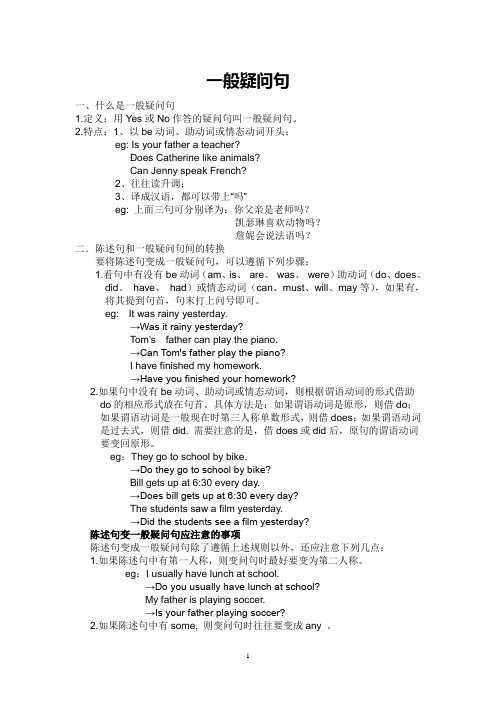
一般疑问句一、什么是一般疑问句1.定义:用Yes或No作答的疑问句叫一般疑问句。
2.特点:1、以be动词、助动词或情态动词开头;eg: Is your father a teacher?Does Catherine like animals?Can Jenny speak French?2、往往读升调;3、译成汉语,都可以带上“吗”eg: 上面三句可分别译为:你父亲是老师吗?凯瑟琳喜欢动物吗?詹妮会说法语吗?二.陈述句和一般疑问句间的转换要将陈述句变成一般疑问句,可以遵循下列步骤:1.看句中有没有be动词(am、is、are、was、were)助动词(do、does、did、have、had)或情态动词(can、must、will、may等),如果有,将其提到句首,句末打上问号即可。
eg: It was rainy yesterday.→Was it rainy yesterday?Tom's father can play the piano.→Can Tom's father play the piano?I have finished my homework.→Have you finished your homework?2.如果句中没有be动词、助动词或情态动词,则根据谓语动词的形式借助do的相应形式放在句首。
具体方法是:如果谓语动词是原形,则借do;如果谓语动词是一般现在时第三人称单数形式,则借does;如果谓语动词是过去式,则借did. 需要注意的是,借does或did后,原句的谓语动词要变回原形。
eg:They go to school by bike.→Do they go to school by bike?Bill gets up at 6:30 every day.→Does bill gets up at 6:30 every day?The students saw a film yesterday.→Did the students see a film yesterday?陈述句变一般疑问句应注意的事项陈述句变成一般疑问句除了遵循上述规则以外,还应注意下列几点:1.如果陈述句中有第一人称,则变问句时最好要变为第二人称。
人教版英语七下_Unit 9 选择疑问句(语法专练)
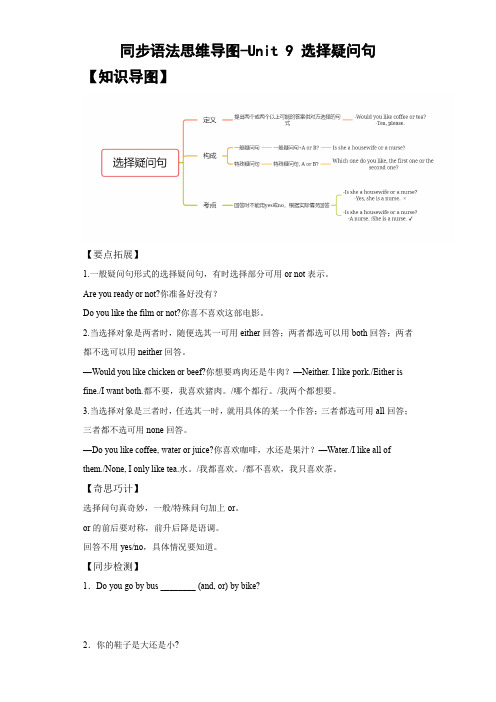
【详解】句意:她将要学跳舞和唱歌。原句改为选择疑问句,be动词“is”放置句首,首字母要大写,选择疑问句中“and”要变为“or”。故填Is; or。
11.C
【详解】句意:——你经常去净月公园吗,开车还是骑自行车?——骑自行车。我认为它对环境和我们的健康有好处。
考查选择性疑问句。根据“Do you often go to Jingyue Park, by car or by bike”可知,选择性疑问句直接回答具体的内容,也就是“开车”还是“骑自行车”。结合“I think it’s good for the environment and our health”及常识可知,骑自行车对环境和健康都有好处,故选C。
考查选择疑问句回答。原句是选择疑问句,回答要用疑问句中提到的两部分中的其中一部分回答,结合“Doing more exercise is good for my health.”可知,这里应是选择游泳,故选C。
—Do you like coffee, water or juice?你喜欢咖啡,水还是果汁?—Water./I like all of them./None, I only like tea.水。/我都喜欢。/都不喜欢,我只喜欢茶。
【奇思巧计】
选择问句真奇妙,一般/特殊问句加上or。
or的前后要对称,前升后降是语调。
8.Can or
【详解】句意:我的哥哥会弹吉他。选择疑问句的结构是:一般疑问句+or+选择内容。原句是含有情态动词“can”的句子,所以变一般疑问句时将can提前,且注意首字母大写。故填Can;or。
9.Is she from China or America?
【详解】句意:她来自中国。选择疑问句用or连接并列单词China和America,疑问句将is提到句首,故填Is she from China or America?
15 疑问句,祈使句和感叹句

2. 特殊疑问句
对句中某一特殊部分提出疑问,通常以who, which, where, when, why, how等疑问词开首. 特殊疑问句针对疑问词来回答, 不用yes或no. What is this? 这是什么? --It’s a ball. 是只球.
3. 选择疑问句
选择疑问句提供两个以上答案,要求对方选其一来回答. 回答时不用yes或no.而要用一个完整的句子或其省略形式 Would you like tea or coffee? 你想要茶还是咖啡? --Coffee, please. 请给我咖啡.
你认为这电影怎样? What do you think of the film? How do you like the film? How was the film? ---It’s good. ---It’s good. ---It’s good.
4. What does he look like?------What is he like? 询问某人外表举止如何.
(3) 与how相关的特殊疑问词
1. how 如何、怎样 (提问形容词、副词、介词短语)
We give a computer instruction 你妈妈怎样? (身体好吗) How is your mother? by putting a programme into it. How old are you? How far is it from Beijing to Shanghai? How big is your room? 如用动词cost(花钱),疑问词可用how much, 也可用what How much / What does this coat cost?
2. 疑问词+一般疑问句语序? (问宾语、谓语、表语、状态或定语)
英语句子讲解大全

英语句子讲解大全英语句子按使用目的来分可分为四类:陈述句、疑问句、祈使句和感叹句。
一、陈述句1、概述用来叙述一个事实或观点的句子叫陈述句(declarative sentence)。
陈述句有肯定和否定两种形式,一般用降调,句末用句号。
They lead an active life which keeps up their normal body temperature, even in very cold winter weather.他们生活很活跃,即使在严寒的冬天也能保持正常的体温。
If you do have difficulties, it is better to try again another day.如果你的确有困难,最好改天再试一试。
This is a most troublesome case. 这是一个非常麻烦的案子。
(1)用not和助动词或情态动词否定not一般放在助动词或情态动词之后。
The villagers didn't allow them to do this. 村民们没有允许他们这样做。
If they cannot do this, they have not really learned the spirit of the foreign language and cannot use it freely. 如果做不到这一点,他们就没有真正掌握外语的本质,也就不能运用自如。
(2)用否定副词或代词否定not以外的否定词no、none、nobody、nothing、never、seldom、hardly、little、neither、nor等也构成陈述句的否定式。
None of you watched carefully enough. 你们当中谁都观察得不够仔细。
Song writers are no longer writing about the modern values of the US 歌曲作者不再写美国的现代价值。
不用Yes或No来回答的一般疑问句

i l了
: o r r
,
.
e
o u
e
n o
o
n o
,
,
,
婉 言谢
绝
。
如 Wo 一I
C
o
u
:
u
ld d lo ld
y
o u
lik
to
e o
,
e
t
o
9
0
t
u
o
th
s e e
r
e
20
0 w i th
u s
u s n o
? w
.
’
v e o
u
b : I t 下o m
e
l
o n
,
’
m b s
认n
’
y
y
’
ta
k
r e
e
了。 “ w
e
,
5 0
’
lo
t
u
g
.
t
o
d
o
y
o
u
r
ho m
w
o
r
k?
一W
D
o
e
ll
0 U
it m y
a s n
t
ha t
y
m be
s
l
r
。
a t w五
l
t
o
ld y
o
“
la
s
t
t
im
e
?
一
梦
I 也
s o r r
r
44
,
不 用
Y
句型转换和特殊疑问句的语法

句型转换和特殊疑问句的语法肯定句、否定句、一般疑问句的相互转换一、含有的be动词、助动词和情态动词的句子;一律在be动词、助动词和情态动词后加“not”,改为一般疑问句时,一律将be动词、助动词和情态动前移到句首(首字母大写)。
肯定回答用“Yes”;否定回答用“No”。
“Yes”或“No”后面的主语必须用代词,“No”后面必须用否定缩略式。
1. There are some computers in this school. (be动词)There aren’t any computers in this school.Are there any computers in this school? (Y es, there are. / No, there aren't.)2. Li Ming’s father can drive the car. (情态动词)Li Ming’s father can’t drive the car.Can Li Ming’s father drive the car? (Yes, he can. / No, he can’t.)3. She has already finished his homework now. (助动词)She hasn’t finished his homework yet.Has she finished his homework yet? (Y es, she has. / No, she hasn’t.)二、只有行为动词的句子。
必须借助助动词do; does; did。
改为否定句,在行为动词前加don’t(一般现在时态,主语是除第三人称单数之外的人称和数时);doesn’t(一般现在时态,主语是第三人称单数时);didn’t(一般过去时态)。
改为一般疑问句时,在句首加Do;Does 或Did。
肯定回答用“Yes”,后面动词用 do; does或did”;否定回答用“No”,后面动词用don’t (doesn’t; didn’t)”。
一般疑问句讲解(含练习和答案)

一.将陈述句变成一般疑问句。
1. 1. 看句中有没有看句中有没有be 动词(动词(am am am、、is is、、 are are、、 was was、、 were were)、助动)、助动词(词(do do do、、does does、、did did、、have have、、 had had)或情态动词()或情态动词()或情态动词(can can can、、must must、、will will、、may 等),如果有,将其提到句首,句末打上问号可。
例:(1):(1)——It was rainy yesterday. It was rainy yesterday. ——Was it rainy yesterday?(2)(2)——Tom's father can play the piano. piano. ——CanTom's father play the piano?2.2.如果句中没有如果句中没有be 动词、助动词或情态动词,则根据谓语动词的形式借助do 的相应形式放在句首。
具体方法是:如果谓语动词是原形,则借do do;如果谓语动词是一般现在时第三人称单数形式,则;如果谓语动词是一般现在时第三人称单数形式,则借does does;;如果谓语动词是过去式,则借did. did. 需要注意的是,需要注意的是,借does 或did 后,原句的谓语动词要变回原形。
例:(1) —Tom likes listening to music.—Does Tom like listening to music?(2) (2) ——Bill gets gets up up at 6:30 6:30 every every day. day. ——Does Bill get up at 6:30 every day?二、一般疑问句的回答一般疑问句往往采用简短回答,一般疑问句往往采用简短回答,共由三部分组成,共由三部分组成,对这三部分的确定可以概括例下:1.1.第一部分:不是第一部分:不是Yes 就是No No。
句法总结与练习

句法总结与练习陈述句:说明事实与陈述人的看法的句子,包括肯定与否定形式。
练习:把下列各词连成陈述句1.see, a map, can, I, the, wall, on2.does, often, the go, Lucy, park, not, to3.right, he, I, think, is, don’t4.not, have, yet, work, the, they, finished.5.the, exam, Chinese, Jim, fail, in, may一般疑问句:1.be动词,助动词,情态动词前移至句首,并用Yes和No回答。
2.读升调,答句用降调。
练习:将下列句子变成一般疑问句,并做肯定与否定回答。
1.They are playing basketball on the playground.2.They can borrow books from the library.3.He has many English novels in his family.4.They go to school on foot every day.5.His father went to France last year.6.We have made a lot of beautiful clothes these days.7.He has finished his homework.8.I will pass on a messge to her.9.I would like a cup of milk, please.10.We have many cakes for supper. (变为否定疑问句)11.It is a wonderful skirt. (变为否定疑问句)12.I want to come with you. (变为否定疑问句)13.I told you to come earlier. (变为否定疑问句)14.I have been to Dalian three times. (变为否定疑问句)15.We were watching TV at this time last night.16.He must stop smoking.17.Tom and Jerry are playing with a ball.18.She had finished her homework when her mother got home.19.I have had lunch with Tom today.20.The peasants are getting ready for the next year.特殊疑问句:1.一般情况:疑问词+一般疑问句2.疑问词在句中充当成分。
【高中英语】高中英语知识点:肯定句
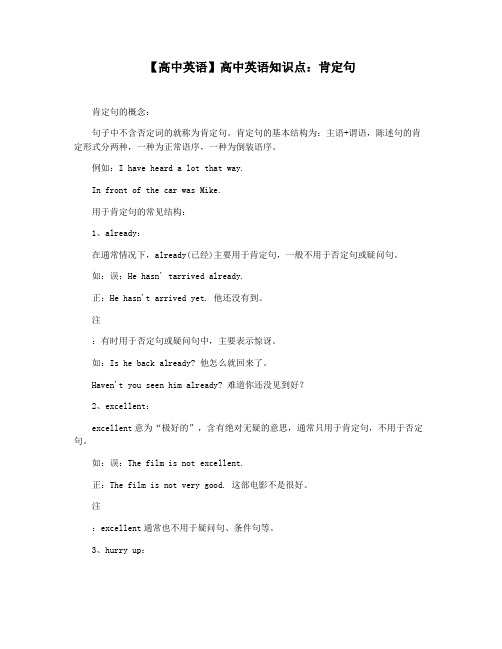
【高中英语】高中英语知识点:肯定句肯定句的概念:句子中不含否定词的就称为肯定句。
肯定句的基本结构为:主语+谓语,陈述句的肯定形式分两种,一种为正常语序,一种为倒装语序。
例如:I have heard a lot that way.In front of the car was Mike.用于肯定句的常见结构:1、already:在通常情况下,already(已经)主要用于肯定句,一般不用于否定句或疑问句。
如:误:He hasn' tarrived already.正:He hasn't arrived yet. 他还没有到。
注:有时用于否定句或疑问句中,主要表示惊讶。
如:Is he back already? 他怎么就回来了。
Haven't you seen him already? 难道你还没见到好?2、excellent:excellent意为“极好的”,含有绝对无疑的意思,通常只用于肯定句,不用于否定句。
如:误:The film is not excellent.正:The film is not very good. 这部电影不是很好。
注:excellent通常也不用于疑问句、条件句等。
3、hurry up:hurry up主要用于肯定句(尤其是肯定的祈使句),一般不用于否定句。
在否定句中,用hurry即可。
如:误:Don't hurry up; we have enough time.正:Don't hurry; we have enough time. 别急,我们有的是时间。
4、plenty(of):在通常情况下,plenty(of)用于肯定句中,而不用于否定句中。
如:误:Have you plenty of food for the holidays?正:Have you enough food for the holidays? 你有足够的食物供假期里吃吗?注:在否定句或疑问中用enough, much, many等代之。
初中语法-陈述句、疑问句、祈使句、感叹句
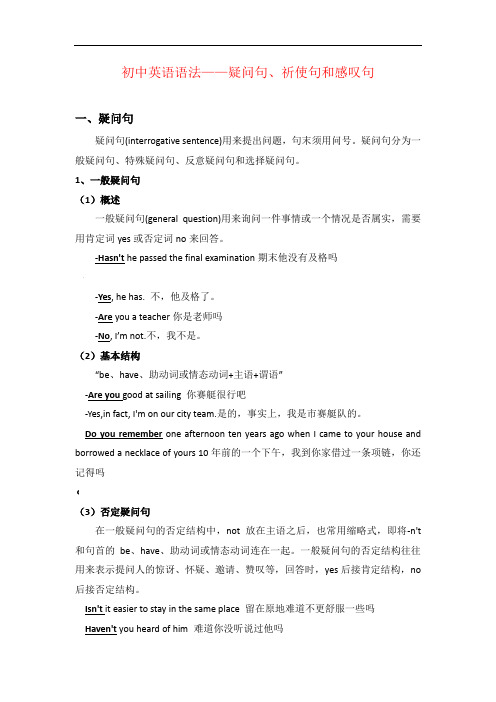
初中英语语法——疑问句、祈使句和感叹句一、疑问句疑问句(interrogative sentence)用来提出问题,句末须用问号。
疑问句分为一般疑问句、特殊疑问句、反意疑问句和选择疑问句。
1、一般疑问句(1)概述一般疑问句(general question)用来询问一件事情或一个情况是否属实,需要用肯定词yes或否定词no来回答。
-Hasn't he passed the final examination期末他没有及格吗·-Yes, he has. 不,他及格了。
-Are you a teacher你是老师吗-No, I’m not.不,我不是。
(2)基本结构“be、have、助动词或情态动词+主语+谓语”-Are you good at sailing 你赛艇很行吧-Yes,in fact, I'm on our city team.是的,事实上,我是市赛艇队的。
Do you remember one afternoon ten years ago when I came to your house and borrowed a necklace of yours 10年前的一个下午,我到你家借过一条项链,你还记得吗《(3)否定疑问句在一般疑问句的否定结构中,not放在主语之后,也常用缩略式,即将-n't 和句首的be、have、助动词或情态动词连在一起。
一般疑问句的否定结构往往用来表示提问人的惊讶、怀疑、邀请、赞叹等,回答时,yes后接肯定结构,no 后接否定结构。
Isn't it easier to stay in the same place 留在原地难道不更舒服一些吗Haven't you heard of him 难道你没听说过他吗Can't you just wear a flower instead 难道不可以就戴朵花吗- Didn't he come to see you yesterday他昨天没有去看你吗-No, he didn't.是的,他没来。
小学英语肯定句、否定句、一般疑问句和特殊疑问句的详解
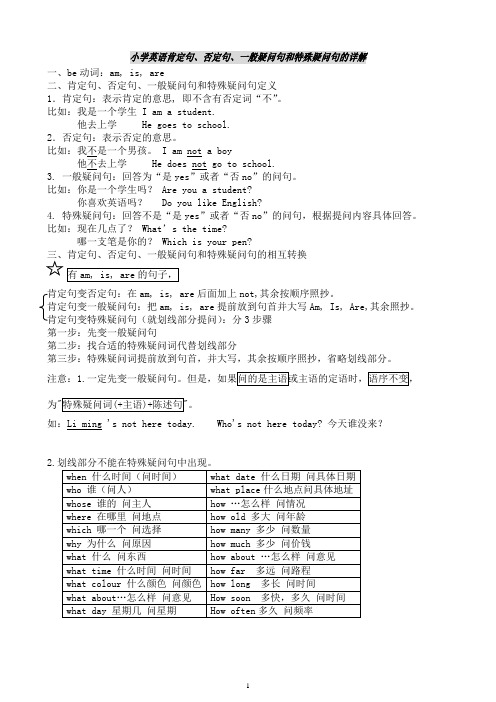
小学英语肯定句、否定句、一般疑问句和特殊疑问句的详解一、be动词:am, is, are二、肯定句、否定句、一般疑问句和特殊疑问句定义1.肯定句:表示肯定的意思, 即不含有否定词“不”。
比如:我是一个学生 I am a student.他去上学 He goes to school.2.否定句:表示否定的意思。
比如:我不是一个男孩。
I am not a boy他不去上学 He does not go to school.3. 一般疑问句:回答为“是yes”或者“否no”的问句。
比如:你是一个学生吗? Are you a student?你喜欢英语吗? Do you like English?4. 特殊疑问句:回答不是“是yes”或者“否no”的问句,根据提问内容具体回答。
比如:现在几点了? What’s the time?哪一支笔是你的? Which is your pen?肯定句变否定句:在am, is, are后面加上not,其余按顺序照抄。
肯定句变一般疑问句:把am, is, are提前放到句首并大写Am, Is, Are,其余照抄。
肯定句变特殊疑问句(就划线部分提问):分3步骤第一步:先变一般疑问句第二步:找合适的特殊疑问词代替划线部分第三步:特殊疑问词提前放到句首,并大写,其余按顺序照抄,省略划线部分。
注意:1.如:Li ming 's not here today. Who's not here today? 今天谁没来?2.例如:1.肯定句、否定句和一般疑问句的互换肯定句:This is a book.否定句:一般疑问句:Is this a book?肯定回答:Yes, it is.否定回答:No, it isn’t.2.就划线部分提问(变特殊疑问句)This is a book.第一步:变一般疑问句 Is this a book?第二步:找合适的特殊疑问词 Is this what ?特殊疑问词提前放到句首,并大写,其余按顺序照抄,省略划线部分。
怎样把英语句子改成一般疑问句
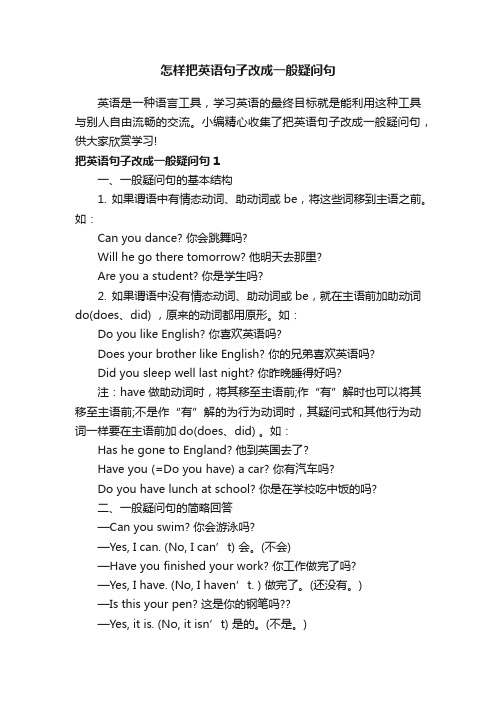
怎样把英语句子改成一般疑问句英语是一种语言工具,学习英语的最终目标就是能利用这种工具与别人自由流畅的交流。
小编精心收集了把英语句子改成一般疑问句,供大家欣赏学习!把英语句子改成一般疑问句1一、一般疑问句的基本结构1. 如果谓语中有情态动词、助动词或be,将这些词移到主语之前。
如:Can you dance? 你会跳舞吗?Will he go there tomorrow? 他明天去那里?Are you a student? 你是学生吗?2. 如果谓语中没有情态动词、助动词或be,就在主语前加助动词do(does、did) ,原来的动词都用原形。
如:Do you like English? 你喜欢英语吗?Does your brother like English? 你的兄弟喜欢英语吗?Did you sleep well last night? 你昨晚睡得好吗?注:have做助动词时,将其移至主语前;作“有”解时也可以将其移至主语前;不是作“有”解的为行为动词时,其疑问式和其他行为动词一样要在主语前加do(does、did) 。
如:Has he gone to England? 他到英国去了?Have you (=Do you have) a car? 你有汽车吗?Do you have lunch at school? 你是在学校吃中饭的吗?二、一般疑问句的简略回答—Can you swim? 你会游泳吗?—Yes, I can. (No, I can’t) 会。
(不会)—Have you finished your work? 你工作做完了吗?—Yes, I have. (No, I haven’t. ) 做完了。
(还没有。
)—Is this your pen? 这是你的钢笔吗??—Yes, it is. (No, it isn’t) 是的。
(不是。
)三、一般疑问句的否定形式当说话人或是期待肯定的回答或是不期待对方的回答时用否定式。
小学英语一般疑问句练习题及答案

小学英语一般疑问句练习题及答案一、将下列句子改成一般疑问句:并做肯定回答和否定回答1.It is a lovely dog.________________________________________ Yes,___________ No,____________2.She is lovely girl.________________________________________ Yes,___________ No,____________3.He is my father._________________________________________ Yes,___________ No,____________4.They are Lily’s cousins. ___________________________________Yes,___________ No,____________5.We are classmates. ______________________________________Yes,___________ No,____________6. I am a doctor. ________________________________________Yes,___________ No,____________7.There is a bird in the tree.________________________________Yes,___________ No,____________8.There are many stars in the sky. ____________________________Yes,___________ No,____________9.They are good friends. ____________________________________Yes,___________ No,____________10. I love my parents. _______________________________________Yes,___________ No,____________11. I play computer games every night. _________________________Yes,___________ No,____________12. There are many books on the shelf. __________________________Yes,___________ No,____________13. There was an ostrich in the zoo. _______________________________Yes,___________ No,____________14. We have a pleasant home. __________________________________Yes,___________ No,____________15. We like to climb the mountain. ______________________________Yes,___________ No,____________16. They go to church on Sunday. ______________________________Yes,___________ No,____________17. They walk to school every morning. __________________________Yes,___________ No,____________18. It is a beautiful park. ______________________________Yes,___________ No,____________19. It is a big map. ______________________________Yes,___________ No,____________20. You were a singer. ______________________________Yes,___________ No,____________有be的就be+not没有Be的就在主语的后面+do not或does not把肯定句改为疑问句就是有be的就把be提到前面来,没有be的就在句首加do或doesEg: I am a teacher. ----I am She likes singing.------She like singing.You are ten.-----Are you ten?They get up at seven o’clock.---- they get up at seven o’clock? 以be 开头的一般问句用yes , I am / No I’m not ….根据主语回答Eg: Is He a doctor? Yes ,he is./No he isn’t.Are they /you/ we late? Yes ,they/ you/we are./ No,they /you/we are not.有be的就be+not没有Be的就在主语的后面+do not或does not把肯定句改为疑问句就是有be的就把be提到前面来, 没有be的就在句首加do或doesEg: I am a teacher. ----I am She likes singing.------She like singing.You are ten.-----Are you ten?They get up at seven o’clock.---- they get up at seven o’clock? 以be 开头的一般问句用yes , I am / No I’m not ….根据主语回答Eg: Is He a doctor? Yes ,he is./No he isn’t.Are they /you/ we late? Yes ,they/ you/we are./No,they /you/we are not.一、述句变一般疑问句练习1. His father is an English teacher.2. These cats are crying.3. They can swim.4. I like to read English.5. I go to school on foot.6. He likes English.7. His father goes to work by bus.8. He is crying under the tree.9. His birthday is on the twentieth of November.10. Mrs. Li and Kitty are in a big shop.11. Kitty is wearing her new uniform.12. The boy under the tree is hungry.13. He goes to school every day.15. I want to have a model car.16. She wants a cup of coffee.17. Mrs. Li and Kitty watch television at night.18. I do my homework after school二、将下列句子改成一般疑问句:1.It is a lovely dog.________________________________________.She islovelygirl.________________________________________.He is myfather._________________________________________.T hey are Lily’s cousins. ___________________________________.We are classmates. ______________________________________.I am a doctor. ________________________________________.There is a bird in the tree. ________________________________.There are many stars in the sky. ____________________________.They are good friends. ____________________________________ 10. I love my parents. _______________________________________ 11.I play computer games every night. _________________________ 12. There are many books on the shelf. __________________________ 13. There is an ostrich in the zoo. _______________________________ 14. We have a pleasant home. __________________________________ 15. We like to climb the mountain. ______________________________16. They go to church on Sunday. ______________________________ 17. They walk to school every morning. __________________________ 18. It is a beautiful park. ______________________________19. It is a big map. ______________________________20. You are a singer. ______________________________ 三、用do does be 填空1> _____ she know all the answers ? Yes , she ____ . No, she _____.> _____ the twins often fight ?Yes ,_____ do. No, _____ don’t.> _____ your dad like listening to music? Yes ,____ does . No, _____ doesn’t.>_____ uncle T om wash his car everyday? Yes , ____ does . No, ____ doesn’t.> _____ you have a new teacher?Yes , I ______. No, I ______.>_____ she a teacher? Yes, she _____ . No, she _____.> ______ you playing ball now? Yes, I ______. No, I ______.> ______ the pig like to sleep? Yes, it ______. No, it _____.> ______ five birds flying in the sky? Yes, they _____ .No, ____ aren’t.10> _____ your father smoking in the living room? Yes, ____ is .No, he _____.小学英语语法一般疑问句1. 概念能用yes / no回答的问句叫一般疑问句。
- 1、下载文档前请自行甄别文档内容的完整性,平台不提供额外的编辑、内容补充、找答案等附加服务。
- 2、"仅部分预览"的文档,不可在线预览部分如存在完整性等问题,可反馈申请退款(可完整预览的文档不适用该条件!)。
- 3、如文档侵犯您的权益,请联系客服反馈,我们会尽快为您处理(人工客服工作时间:9:00-18:30)。
不用yes和no回答的一般疑问句
作者:石继忠
来源:《中学文科·初中版》2008年第07期
对于英语里的一般疑问句,肯定回答常用yes,否定回答常用no。
如:—Are you a student?—Yes, I am.或—No, I’m not.但实际运用中并非一概而论,而要根据说话的环境和说话人的感情,采用灵活多样的形式来回答。
1.当你乐于接受对方的邀请或请求、建议时,可不用yes或no来回答。
①—I want to go swimming. Can you go with me?
我想去游泳。
你能和我一块儿去吗?
—Certainly.
当然可以。
②—Will you please give me a hand?
请你帮我一下,好吗?
—I am glad to.
我很乐意那样做。
2.表示肯定或否定的语气较强或较弱时,可不用yes或no来回答。
如:
①—Is it broken?
它破了吗?
—I don’t think so.
我想没有吧。
②—Do you love me, Son?
你爱我吗,儿子?
—Why, of course, Mum.
当然,妈妈。
3.婉言谢绝对方的建议或请求,或不能给对方明确的回答,常用Sorry...; I’m not sure; I’m afraid not等。
如:
①—Can you go with us?
你能和我们一块儿去吗?
—Sorry, I have a lot of homework to do.
很抱歉,我有许多家庭作业要做。
②—Could you come to dinner on Sunday?
星期天你能来吃晚饭吗?
—That’s very kind of you, but I’m afraid I can’t come.
太谢谢了,但是我恐怕不能来。
4.用表示不同程度的肯定或否定的词语:probably, perhaps, very often, almost, a little等来回答。
如:
①—Do you speak English?
你会说英语吗?
—A little.
会一点。
②—Did you finish your article last night? 你昨晚完成论文了吗?
—Almost. I still have ten more pages to type.
差不多完成了,可是我还有十页要打。
5.当对方问你介意与否时,如不用yes或no来回答,可用其他形式。
如:
①—Would you mind if I open the door? 我打开门你介意吗?
—Not at all.
不介意。
②—Do you mind closing the window?
关上窗户你介意吗?
—Of course not./Certainly not.
当然不介意。
—I’m sorry, but I would.
抱歉,我介意。
6.答者重复问者所问的全部或部分内容,用以表示惊讶、怀疑或不同意时,不用yes或no。
如:
①—Would you like some apples?
你喜欢苹果吗?
—Apples!Mm!I love them.
苹果!嗯!我喜欢。
②—Did people in China study Englisha long time?
中国人很久以前就学英语吗?
—Not so long ago.
时间不很长。
7.回答“责备”等意的一般疑问句,有时也可以不直接用yes或no回答。
如:
—The noise wakes me up!Would you please not do that?
噪音常把我吵醒,请你不要那样做,好吗?
—I am very sorry, sir. I won’t do it again.
很抱歉,先生。
我以后不再那样了。
